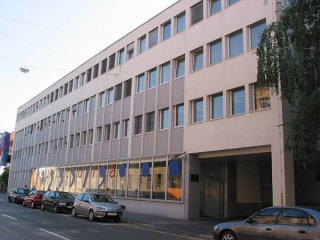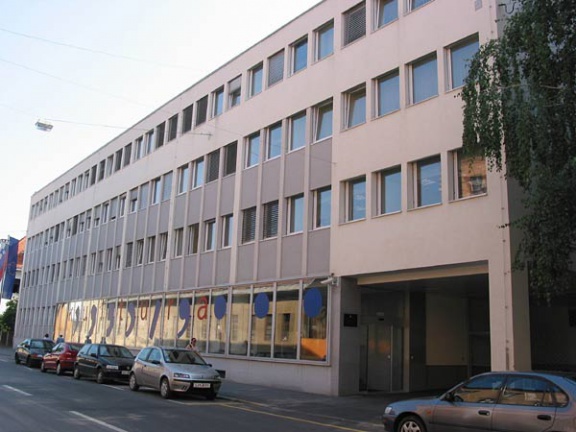Difference between revisions of "Ministry of Culture"
(sipo) |
(žekš) |
||
| Line 15: | Line 15: | ||
|website = http://www.mk.gov.si/ | |website = http://www.mk.gov.si/ | ||
|contacts = {{contact | |contacts = {{contact | ||
| − | |name = | + | |name = Boštjan Žekš |
| − | |role = Minister | + | |role = Acting Minister |
}} | }} | ||
{{contact | {{contact | ||
| − | |name = | + | |name = |
|role = State Secretary | |role = State Secretary | ||
}} | }} | ||
Revision as of 16:49, 13 July 2011
-
to
20 Apr 2024
24 Nov 2024
"Garden Secret for You", a project by the conceptual artist Nika Špan, curated by Vladimir Vidmar, Moderna galerija / Museum of Modern Art, Ljubljana plus Museum of Contemporary Art Metelkova. The biennial theme "Foreignes everywhere" by curator Adriano Pedrosa. Supported by the Ministry of Culture.
at the La Biennale di Venezia International Art Exhibition
-
19 May 2024
United Kingdom of Great Britain London Pigot Theatre British Library,Pigott Theatre Knowledge Centre
Slovenian author Sebastijan Pregelj will be participating in the festival as part of the "Breaking Boundaries" panel.
Participation of Slovenia at the festival is supported by the Cultural Fund run jointly by the Ministry of Culture and the Ministry of Foreign and European Affairs. In partnership with Slovenian Book Agency and Goga Publishing House.
at the European Writers' Festival
-
23 May 2024
"SHE - ONA", a vocal-dance solo performance by Anamaria Klajnšček, produced by Flota Institute and Emanat Institute and coproduced by Dance Theatre Ljubljana. Supported by Ministry of Culture and Municipality of Ljubljana.
at the Monotánc Fesztivál
-
12 May 2024
A performance of "Superfluous - Odvečni", based on the famous essay by Ilija Trojanow and conceptualised by EnKnapGroup (EKG). Supported by Ministry of Culture and Department of Culture of Municipality of Ljubljana.
at the Rollercoaster
-
20 Apr 2024
"Superfluous - Odvečni", an original dance performance by EnKnapGroup (EKG) with an international cast. Supported by Ministry of Culture and Municipality of Ljubljana.
-
to
20 Apr 2024
28 Apr 2024
"That's How the Summer Ended" by Matjaž Ivanišin will be screened at the festival on two locations. Participation of Slovenia at the festival is supported by the Cultural Fund run jointly by the Ministry of Culture and the Ministry of Foreign and European Affairs, and aimed at promoting Slovenian culture abroad. In partnership with Slovenian Film Centre.
at the In Short, Europe
-
to
6 Apr 2024
12 Apr 2024
Slovenia - Guest of Honour Country at the Bologna Children's Book Fair 2024 programme organised by the Slovenian Book Agency, supported by the Ministry of Culture
at the Bologna Children's Book Fair
-
to
18 Oct 2023
22 Oct 2023
Honeycomb of Words, Slovenia – Guest of Honour Country at the Frankfurt Book Fair 2023. Supported by the Ministry of Culture and Slovenian Book Agency, as well as by SKICA Berlin, Slovenian Cultural Centre, Embassy of the Republic of Slovenia Berlin.
at the Frankfurt Book Fair
-
to
20 May 2023
26 Nov 2023
Within the The Laboratory of the Future Biennial topic by the curator Lesley Lokko, an exhibition +/- 1 °C: In Search of Well-Tempered Architecture curated by Jure Grohar, Eva Gusel, Maša Mertelj, Anja Vidic, Matic Vrabič. A commisioner Maja Vardjan from the Museum of Architecture and Design. Supported by the Ministry of Culture.
at the International Architecture Exhibition - la Biennale di Venezia
-
to
21 Apr 2022
27 Nov 2022
Without a Master, a series of paintings by Marko Jakše, curated by Robert Simonišek, Moderna galerija / Museum of Modern Art, Ljubljana plus Museum of Contemporary Art Metelkova, and supported by the Ministry of Culture
at the La Biennale di Venezia International Art Exhibition
-
to
1 Dec 2021
31 Dec 2021
Slovenian Film Retrospective, a selection of classic Slovenian films, prepared by Slovenian Film Centre and Slovenian Cinematheque in cooperation with the Royal Belgian Film Archive in Brussels, in the context of the Slovenian Presidency of the EU, supported by the Slovenian Ministry of Culture
-
to
22 May 2021
21 Nov 2021
Within the topic How Will We Live Together?, The Common in Community - Seventy Years of Cooperative Centres as a Social Infrastructure, a project curated by architects Blaž Babnik Romaniuk and Rastko Pečar and art historians Martina Malešič and Asta Vrečko with commissioner Matevž Čelik Vidmar, produced by the Museum of Architecture and Design, supported by the Ministry of Culture,
at the International Architecture Exhibition - la Biennale di Venezia
-
to
11 May 2019
24 Nov 2019
A project by Marko Peljhan (Projekt Atol Institute), curated by Igor Španjol, produced by Moderna galerija / Museum of Modern Art, Ljubljana plus Museum of Contemporary Art Metelkova, and supported by the Ministry of Culture
at the La Biennale di Venezia International Art Exhibition
-
to
26 May 2018
25 Nov 2018
Museum of Architecture and Design presents the project Living with Water by an international team of architects and researchers, curated by Matevž Čelik and supported by the Ministry of Culture, featuring two installations and a publication, edited by Nina Granda, Matevž Granda and team, as the Slovene representative in the Slovenian Pavilion,
at the International Architecture Exhibition - la Biennale di Venezia
-
to
13 May 2017
26 Nov 2017
Newsreel 63, a project by Nika Autor, curated by Andreja Hribernik, produced by Moderna galerija / Museum of Modern Art, Ljubljana plus Museum of Contemporary Art Metelkova, and supported by the Ministry of Culture
at the La Biennale di Venezia International Art Exhibition
-
to
28 May 2016
27 Nov 2016
Home at Arsenale, a bespoke wooden library by Dekleva Gregorič Arhitekti, co-organised by the Museum of Architecture and Design in Ljubljana, and supported by the Ministry of Culture), as a Slovene representative at the 15th International Architecture Exhibition - la Biennale di Venezia
-
to
5 May 2015
22 Nov 2015
UTTER / The violent necessity for the embodied presence of hope, a project by JAŠA produced by Maribor Art Gallery in collaboration with WEARE Production, supported by the Ministry of Culture)
at the La Biennale di Venezia International Art Exhibition
-
to
6 Jun 2014
23 Nov 2014
The project The Problem of Space Travel - Supre: Architecture by the Cultural Centre of European Space Technologies (KSEVT) as the Slovene representative at the 14th International Architecture Exhibition - la Biennale di Venezia, supported by the Ministry of Culture,
-
to
30 May 2013
24 Nov 2013
For our Economy and Culture, a project by Jasmina Cibic at the Slovenian Pavilion (co-organised by the Museum and Galleries of Ljubljana and Škuc Gallery) at the 55th Venice Biennale, supported by the Ministry of Culture
at the La Biennale di Venezia International Art Exhibition
-
to
29 Aug 2012
25 Nov 2012
The project 100 YC (Maribor - 100 Year City) at the 13th Venice Biennale of Architecture, supported by the Ministry of Culture
-
to
4 Jun 2011
30 Oct 2011
Heaters for Hot Feelings, Mirko Bratuša's sculpture exhibition at the 54th Venice Biennale, organised by Božidar Jakac Gallery, Kostanjevica na Krki, supported by the Ministry of Culture,
-
to
29 Aug 2010
21 Nov 2010
All Shades of Green project by Studio AKKA and Studiobotas at the 12th Venice Bienniale of Architecture, produced by the City Museum and Galleries of Ljubljana, supported by the Ministry of Culture
Tasks
It is the task of the Ministry of Culture to provide suitable opportunities for cultural creation and the protection of the cultural heritage. To this end, the Ministry works on the basis of the three main principles of cultural policy: quality, accessibility, and diversity. Undoubtedly the first task of the Ministry is to provide suitable opportunities for top-level creativity in cultural spheres. Equally important is the guaranteeing of the greatest possible accessibility of cultural assets, since the right to culture ranks among fundamental human rights. Closely connected to these two principles is the attention that the Ministry of Culture devotes to cultural diversity. Additionally, the Ministry protects the right to freedom of expression in the media and ensures the media pluralism.
Background
The Ministry of Culture was founded in June 1991 on the basis of the Organisation and Competence of the Republic Administration Act. Under this Act, the existing Republic Secretariat for Culture continued its work as the Ministry of Culture and took over its functions and staff. The existing Republic Secretary for Culture became the Minister for Culture. After Slovenia's proclamation of independence, the Republic of Slovenia gained its first Minister for Culture on 28 June 1991, the day the Act entered into force.
Funding
Where funding of public institutions is concerned, there are special calls for archive institutions and libraries, for movable cultural heritage institutions (mostly museums), for unmovable cultural heritage projects (investments in infrastructure) and for audio-visual programmes. All public state cultural institutions are required to present their following year's programmes to the Ministry of Culture, which then decides on their annual subsidy according to the annual budget.
For non-governmental organisations, the Ministry announces (usually in Autumn) a call for public cultural programmes and projects. From amongst applicants in various disciplines 42 cultural programme organisers and producers were selected to sign 4-year contracts for the period 2010–2013, most of them professional support organisations or the producers running a venue or festival platforms. In addition there is a bid for the 4-year author projects and an annual bid for artistic projects in all art disciplines, which is open also to smaller organisations and individual artists. Another call covers vocational training organised by NGOs.
There are also some additional special public calls related to international co-operation. One is open to creators to bid for short-term residency in apartments owned by the Ministry in New York City, Berlin, London and since 2011 also in Paris. Another determines the operator of the EU Cultural Contact Point Slovenia, the Mediadesk.si and the info hub of the Balkan Incentive Fund for Culture (BIFC). Other calls are for the organisers/curators of the Venice Biennale and Venice Biennale of Architecture, or for Slovene galleries to participate in significant international artfairs.
Every year there is also a special call for cultural activities by the Italian and Hungarian ethnic minorities, the Romany community and other ethnic minority groups and immigrants in the Republic of Slovenia.
Funding related to literature and publishing has been performed by the Slovenian Book Agency, while the national cultural programme in the sphere of film is implemented by the Slovenian Film Centre.
Survey the Economic Contribution of the Copyright-Based Industries in Slovenia
In 2010 the Ministry of Culture together with the Slovenian Intellectual Property Office (SIPO) funded a Survey the Economic Contribution of the Copyright-Based Industries in Slovenia. The study is based on the WIPO methodology and has been available online since 2011. The survey offers a complex comparative quantitative analysis of the contribution of specific sectors based on the statistics from 2002 and 2007. It reveals that the copyright-based industries contribute 5.1 % to GDP and secure 6.8 % jobs on the national level.
See also
- Directorates, sectors and departments
- Bodies under the Ministry
- Funds
- National Councils





